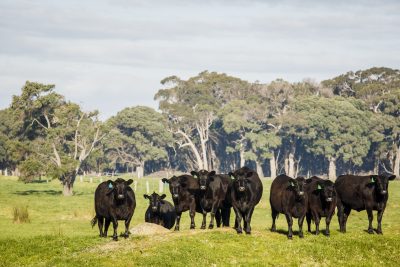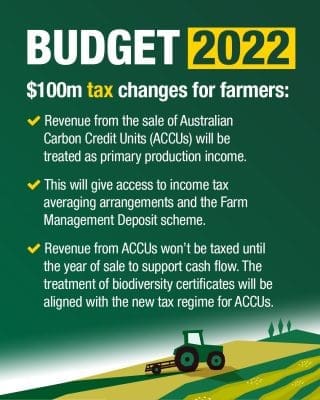THE Morrison Government has announced it will apply concessional tax treatment to primary producers that generate revenue from the sale of Australian Carbon Credit Units (ACCUs) and biodiversity certificates.
 Under the new tax regime, farmers will treat revenue from the sale of ACCUs as primary production income, providing access to income tax averaging arrangements and the Farm Management Deposit scheme. Revenue from ACCUs will be recognised in the year of sale to support cash flow. The treatment of biodiversity certificates will be aligned with the new tax regime for ACCUs.
Under the new tax regime, farmers will treat revenue from the sale of ACCUs as primary production income, providing access to income tax averaging arrangements and the Farm Management Deposit scheme. Revenue from ACCUs will be recognised in the year of sale to support cash flow. The treatment of biodiversity certificates will be aligned with the new tax regime for ACCUs.
Minister for Agriculture and Northern Australia, David Littleproud MP, said today’s announcement will further encourage carbon abatement and biodiversity activities, while providing primary producers with a diversified source of on-farm income.
“We want to give genuine farmers more options when deciding to hold or sell their credits—whether for investment purposes or to enhance the environmental credentials of their operations—without being penalised,” Minister Littleproud said.
“This is removing barriers for farmers who want to do the right thing by their farm and the changes are expected to deliver $100 million to their bottom line over the next four years.”
 Minister for Industry, Energy and Emissions Reduction Angus Taylor MP said the changes would encourage more farmers to take part in the Emissions Reduction Fund and earn revenue from ERF projects.
Minister for Industry, Energy and Emissions Reduction Angus Taylor MP said the changes would encourage more farmers to take part in the Emissions Reduction Fund and earn revenue from ERF projects.
“The government is ensuring Australian farmers are rewarded for bringing down emissions,” Minister Taylor said.
“The new tax changes mean farmers will get an even greater benefit from the income they earn selling Australian Carbon Credit Units.”
“Labor’s Safeguard Mechanism carbon tax will increase the cost of running an energy-intensive business in Australia – hitting everything from fuel refineries to fertiliser plants. That means higher costs and lower productivity for Australian farming operations.”
Assistant Treasurer, Michael Sukkar MP, said this announcement is another practical step by the Government to reduce emissions.
“A core element of the Morrison Government’s Economic Plan is to put in place incentives for a private sector led economic recovery and target higher value add activities which will deliver productivity growth,” Minister Sukkar said.
“The tax changes announced today will encourage farmers to undertake critical investment in carbon abatement while also providing Australia’s innovative agriculture sector with ongoing cash flow support.”
BDO tax partner and food and agribusiness specialist Andrew Jones thinks that the tax definition of a “primary production business” may be expanded following today’s announcement.
“Not only is today’s announcement common sense, it signals an acknowledgement by the Government that environmental services provided by farmers are part and parcel of their primary production activities, rather than a different business activity altogether as is the situation under the current law,” said Mr Jones.
“The changes will mean more certainty for farmers when it comes to understanding their after-tax returns of participating in these programs.”
Sources: Minister for Agriculture, BDO

Hi – I can understand that treating the carbon credits as primary production income is a benefit to farmers. The treatment of Biodiversity Credits as primary production income is not a benefit to farmers.
The reason for this is that a biodiversity credit is a CGT asset for tax purposes and entitles the holder to a 50% discount on the capital gain if it is held for more than a year. There is also the potential to access the small business concessions (if eligible) on the capital gain – which a farmer would not have access to if the income was to be treated as primary production income.
So instead of delivering $100m to the bottom line of primary producers over the next four years, this is going to cost them significantly.